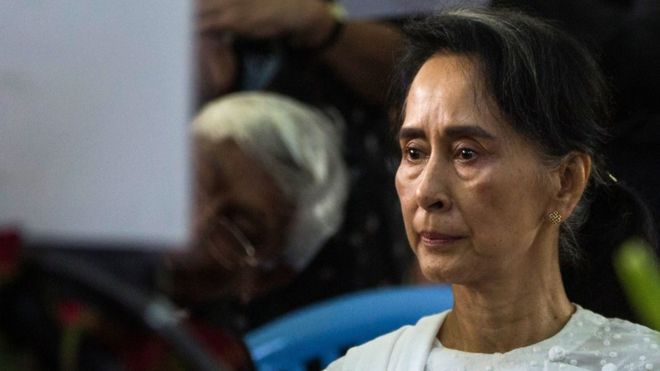In her first comments on the latest Rohingya crisis, she said tensions were being fanned by fake news promoting the interests of terrorists.
Ms Suu Kyi made the comments in a phone call with Turkish President Recep Tayyip Erdogan, her office said.
More than 123,000 Rohingya have fled Myanmar for Bangladesh in two weeks.
The latest outbreak of violence has sent waves of refugees fleeing the country, which is also called Burma.
What has Suu Kyi said?
The latest government statement said Ms Suu Kyi told Mr Erdogan that her government had "already started defending all the people in Rakhine in the best way possible".
Ms Suu Kyi is quoted as saying: "We know very well, more than most, what it means to be deprived of human rights and democratic protection.
"So we make sure that all the people in our country are entitled to protection of their rights as well as, the right to, and not just political but social and humanitarian defence."
The statement also said there were many fake news photographs circulating which were "simply the tip of a huge iceberg of misinformation calculated to create a lot of problems between different communities and with the aim of promoting the interest of the terrorists".
Is it 'fake news'?
There has certainly been a large amount of "fake news" surrounding recent events.
By 5 September there had been 1.2 million tweets talking about the crisis since refugees began flooding over the border, and many contain pictures purportedly showing a glimpse of the violence which has engulfed the region.
What sparked latest violence in Rakhine?
Who will help Myanmar's Rohingya?
Fake photos inflame tension
The problem is, according to the BBC's south-east Asia correspondent Jonathan Head, "much of it is wrong". A closer look reveals many - but not all - of the pictures come from other crises around the world, with one tweeted by Turkey's Deputy Prime Minister Mehmet Simsek dating back to the Rwandan genocide in 1994.
But the BBC Burmese Service's Tin Htar Swe said much of the blame for Ms Suu Kyi's "iceberg" could be laid at the government's door.
"The fake news is generated because the government is not allowing media access to the troubled areas," she said. What's more, she added, "if they allowed the UN or human rights bodies to go to the place to find out what is happening then this misinformation is not going to take place".
Where are the refugees?





No comments: